UNESCO Recognizes Trogir Brand Strategy as Positive Cultural Tourism Example
November 17, 2021 - The Trogir brand strategy 'Marked by Masters,' officially presented in November 2019, has been recognized by UNESCO as a positive cultural tourism example.
At the end of 2019, the city of Trogir made a big step forward by presenting a new branding strategy, slogan, and visual identity, which was complemented by signage in the city, promotional materials, and a new website, jointly created by the city and the tourist board, reports HRTurizam.
Thus, Trogir became the first destination on the coast and the first city in Croatia, which began branding at such a serious and professional level. The project is called Marked by Masters, and you can read more about it on TCN HERE.
The Trogir brand strategy was recognized as a positive practice by UNESCO. Namely, on its official website, UNESCO writes about the Trogir branding project in the context of its importance for the sustainable development of the destination. "The new branding strategy of the city based on cultural values and community participation aims to increase the attractiveness of Trogir as a destination for cultural tourism," says UNESCO.
This is further confirmation of the value and importance of the project started two years ago, which will be intensively developed in the next five to ten years. It is necessary to fully implement it according to the experience of international cities, said the city of Trogir, adding that they are excited that UNESCO has confirmed their work by sharing the case study for the City of Trogir, authored by the Fabular agency.
"In the Middle Ages, world-class masters worked in Trogir, such as masters Radovan, Nikola Firentinski, Muscardel, Andrea Alessi, and Duknović, creating masterpieces, but also leaving smaller, detailed traces in the old town. The challenge was to unite the city's masters with "medieval graffiti" and games carved into the stone, like chess and merel, which we did by creating a story that called for discovering the traces of masters in every corner of this beautiful city."
According to UNESCO, if the project is fully implemented in accordance with the described plans, the initiative could contribute to sustainable development and the UNWTO (Sustainable Development and the Sustainable Development Goals) sustainable development goals. Trogir has been on the UNESCO list since 1997.
Follow our dedicated travel page for more information on Trogir, Marked by Masters, and much more.
750th Anniversary of First Mention of Trogir Pharmacy, Oldest in Croatia, Marked
ZAGREB, 31 Oct, 2021 - The Split School of Medicine on Tuesday officially marked the 750th anniversary of the first mention of the Trogir apothecary and the beginning of pharmacy in Croatia.
The executive director of the Croatian Pharmaceutical Society (HFD), Maja Jakševac Mikša, said that pharmacy started to develop very early in Dalmatia, noting that the HFD was almost certain that there had been apothecaries in the area of Trogir even before 1271 but there were no written documents about it.
"The document we have concerns the sale of the apothecary but it is unlikely that someone founded an apothecary and sold it right away, so we can say that the apothecary had existed for about ten years before the year in question, and then pharmacies started emerging from Zadar to Dubrovnik. We have the most information on the pharmacy of the Friars Minor in Dubrovnik because it has continued operating to this day, which is a unique case in the world," said Jakševac Mikša.
The head of the Trogir Town Museum, Fani Celio Cega, said that the small town of Trogir had its pharmacy in 1271 when the first pharmacy was opened in Cologne.
"The Trogir pharmacy was unfortunately not preserved because it was located in a block of houses that no longer exists... unlike the Dubrovnik pharmacy, which was established later," said Celio Cega.
The original legal document on the Trogir pharmacy, dated 29 October 1271, is kept in Trogir. That date is considered the beginning of development of pharmacy in Croatia. Pharmacy in Croatia, notably in the area of Dalmatia, started developing very early, in parallel with its development in Europe, where the first pharmacies emerged already in the 12th century and pharmacy blossomed in the 13th century.
For more on lifesyle in Croatia, follow TCN's dedicated page.
For more about Croatia, CLICK HERE.
President Zoran Milanović Visits Wildfire Sites at Seget Gornji
ZAGREB, 4 Aug, 2021 - President Zoran Milanović, accompanied by Chief Firefighting Commander Slavko Tucaković, visited on Wednesday by helicopter locations devastated by wildfires at Seget Gornji, inland from the southern coastal town of Trogir, the President's Office said in a press release.
Before visiting the fire sites, Milanović discussed the situation at wildfire locations at Seget Gornji and in Mirlović in Šibenik-Knin County with local firefighting officials.
Firefighting representatives briefed the president about the efforts firefighters had made so far, and the assistance provided by the Croatian Army.
The president thanked the firemen and all those who helped put out the wildfires.
For more about politics in Croatia, follow TCN's dedicated page.
Fire in Seget Gornji Prevents Planes From Landing at Split Airport
Updated article on the morning of August 3.
August 2, 2021 - A fire in Seget Gornji, in the hills of Trogir, broke out in the morning. Although the houses in the neighborhood are not in danger, the smoke is affecting the air traffic of the Split airport.
A large fire in Seget Gornji broke out around 10.30 am, reports 24sata. It blazed along the road. As we find out, the fire is spreading carried by the wind, but the houses are not endangered for now. All available forces from the fire brigades from Solin, Vranjica, Kaštela, Trogir and Seget Vranjica are on the ground. Police regulate traffic on DC 58 and drive alternately in one lane so that firefighters can use the other lane unhindered. The Split-Dalmatia Police Department appeals to drivers to be careful. Two canadairs are helping the firefighters in the field, and two 'air tractors' are expected to arrive at any moment.
''There are over 100 firefighters and 25 vehicles on the field, and help to firefighters on the field is still arriving. Two canadairs are also helping with the extinguishing. Maquis and low vegetation are burning, and the fire is spreading in the southeast direction'', the county fire commander, Ivan Kovačević, told 24sata.
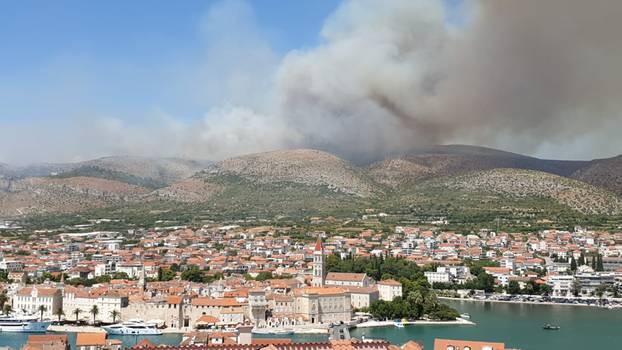
(Photo: 24sata reader)
As we have learned from Pero Bilas, the assistant director of Split Airport, due to the fire near the airport, several planes were sent to alternative runways, points out Dalmatinski Portal. Resnik, says Bilas, was not closed, but there was a disturbance in air traffic. Despite the efforts of all fire brigade units present in the area to control the fire, the smoke continues to be a problem.
''There will be a delay in landing and then taking off. The planes take off from the Split airport'', says Bilas.
Canadairs are constantly flying over because it is the shortest way to the fire.
More will follow...
For more news on Croatia, click here.
Sportyn App Activates New Challenge Feature at Dalmatinko Cup - And Rakitić's Autographed Cleats are Up for Grabs
June 23, 2021 - The Sportyn app will activate its new Challenge feature at the international youth football tournament Dalmatinko Cup this week, where the best footballing skills presented via the Sportyn application will receive the grand prize from Croatian football star Ivan Rakitić!
Organized by the Dalmatinko Association, Dalmatinko Cup is one of the largest international youth football tournaments in Croatia. It is also the first youth football tournament with competition for both boys and girls in its program.
Guided by three components - sports, tourism, and social responsibility, the organizers endeavor to allow the youngest footballers to socialize through sports competitions with peers from other areas, all while promoting Dalmatian tourism, healthy living, and helping those in need.
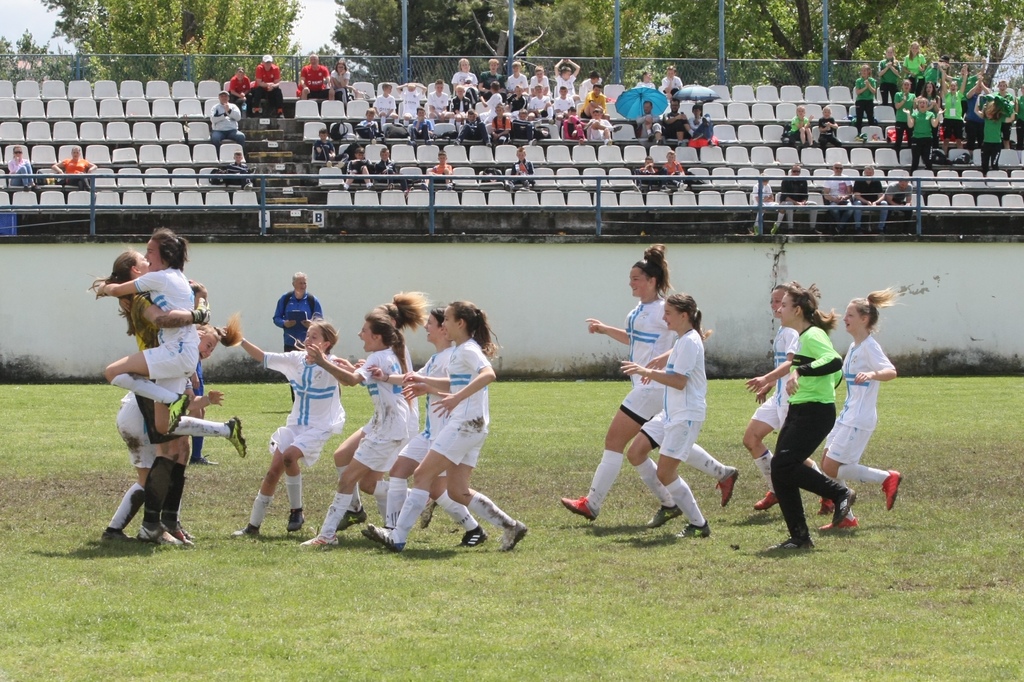
Dalmatinko Cup
“The Dalmatinko Cup was created in 2016 after I visited many football tournaments with my eldest son and saw that the vast majority of them are reduced to just playing football. My desire was to provide children with much more than that - I wanted children to enjoy sports, socialize, and accept tolerance and equality to become better people.
I wanted to create a project that will give children from all over the world, coaches, and parents the opportunity to get to know Croatia's beauties, culture, and heritage. So we created a synergy of sports, social responsibility, and tourism, and then difficultly, created friendships and partnerships with many clubs. Over time, the story of the Dalmatinko Cup, a top organization, children's development, and the values we promote, has led us to today, and we now cooperate with clubs from 23 countries. As a result, Dalmatinko Cup is one of the largest sports projects in Europe,” said Dalmatinko Cup organizer Domagoj Bojčić.
Dalmatinko Cup organizers strive to be active participants in society and community development, promoting sportsmanship, fair play, tolerance, and quality of life. They thus hope to engage in long-term cooperation with international sports teams, the local community, and the local economy.
“The goals of the Dalmatinko Cup are to promote tolerance, gender equality, fair play, and equal opportunities for all children. Our slogan is ‘More than football,’ and in addition to the exceptional sporting quality of the tournament, we offer all participants a whole range of additional facilities, tours, excursions, and the feeling of playing the World Cup. Furthermore, Dalmatinko Cup is the only tournament in Southeastern Europe in which both boys and girls participate. We have 7 men's and 3 women's categories, and many looked at me in amazement when I decided to create a tournament for children of both genders. We are proud of this achievement.
Horizontal goals have imposed themselves. The development of sports tourism in Croatia has been a priority for us from the beginning because this tourist niche has huge potential. We have a beautiful country, a God-given climate, and top sports results, and we have to do everything to take advantage of such comparative advantages and create a real tourism product. The Dalmatian cup gives just that.
Another horizontal goal is to foster social responsibility and an awareness that we must take care of others. We have to teach children the right values, after all, 99% of them will not be professional athletes, but our task is to create better people. Also, altruism, volunteering, and the desire for the community in which we live to be of better quality must be our priorities,” added Bojčić.
In 6 years, the Dalmatinko Cup has gathered over 15,000 athletes from 23 countries. While the COVID-19 pandemic has set limitations in holding this year's tournament, it could not stop the organizers from letting the kids play, all while following epidemiological measures, of course.
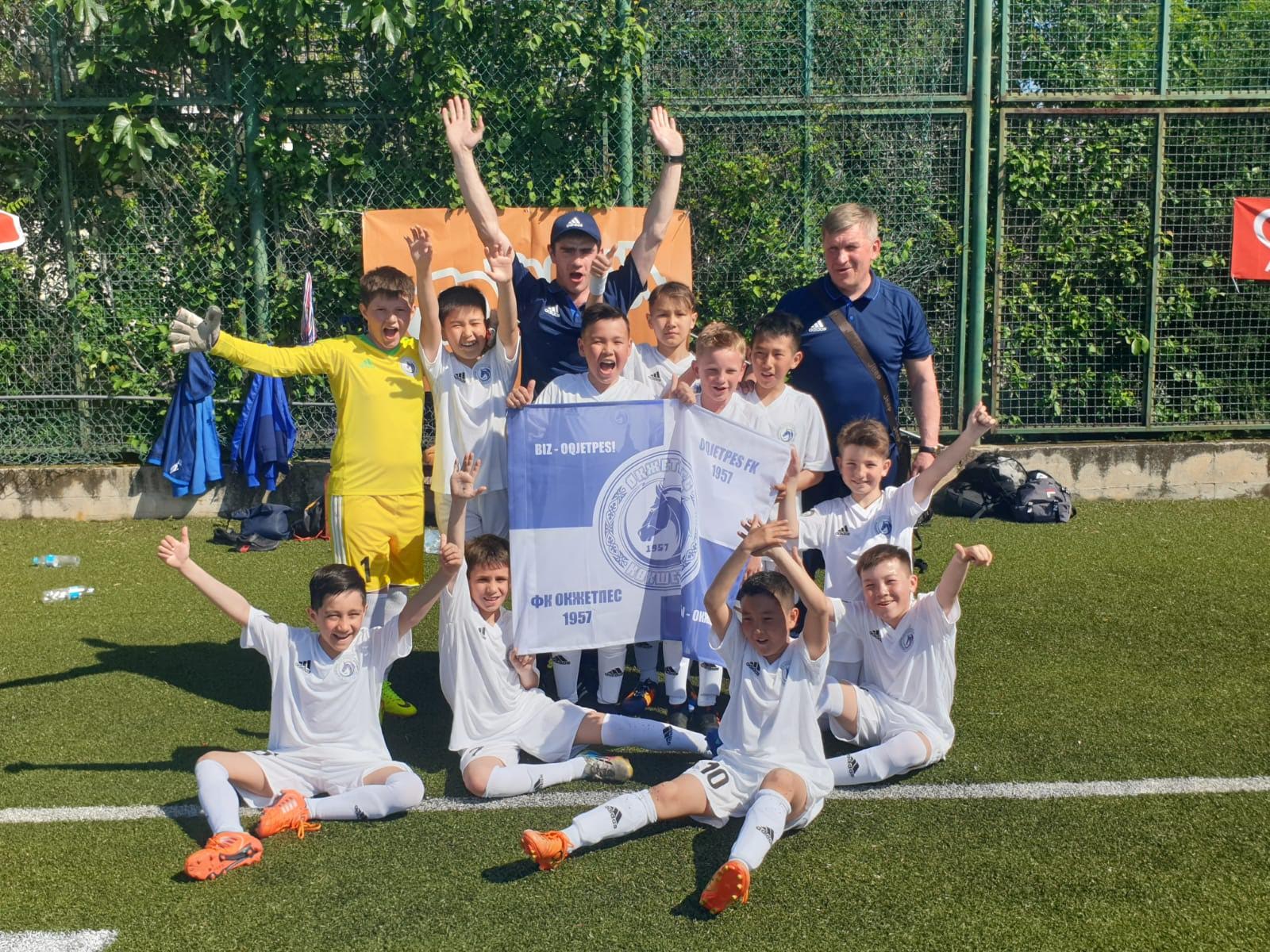
Dalmatinko Cup
Despite the pandemic, this year’s tournament boasts 170 teams from 11 countries.
“We will have about 12,000 overnight stays, and our guests will stay for a few days after the tournament is over. The promotion of Croatia through the Dalmatinko Cup is fantastic, and the strength and quality of the tournament is at the very top of Europe,” said Bojčić.
Thus, from June 24 to 27, Dalmatinko Cup will be held in Kaštel Gomilica (NK GOŠK), Trogir (NK TROGIR), Solin/Vranjic (NK Omladinac), and Split (HNK Hajduk), including around 2,000 participants from Croatia and abroad, in under 8 to under 17 age groups! The opening ceremony will kick off the tournament on the evening of June 24 in Marina Kaštela.
But the beauty of the Dalmatinko Cup is that the football competition is only part of it.
The Dalmatinko Association prides itself in a completely new sports marketing model, which can be seen in the unique offer outside of football. The tournament not only encourages participants to explore the region with organized excursions to Split, Poljud Stadium, or in the museum town of Trogir, but they can even take part in an unforgettable ride at sea on the Plurato Sailfin electric hydrofoil board, suitable for both beginners and experienced watersport enthusiasts.
However, the standout activity at this year's Dalmatinko Cup is presented by Sportyn, an AI video-sharing app to empower all athletes, designed to change the future of player promotion, developing funding, and sports recruitment.
New on the app market, Sportyn was launched by a team of innovators, pro athletes, and entrepreneurs and has even joined forces with former FC Barcelona player and Croatia national team member Ivan Rakitić.
Doing for sport what LinkedIn does for business, Sportyn harnesses the power of vertical integration in social media to level the playing field of sporting opportunity for 2 billion people, and it's activating its new Challenge feature at the Dalmatinko Cup.
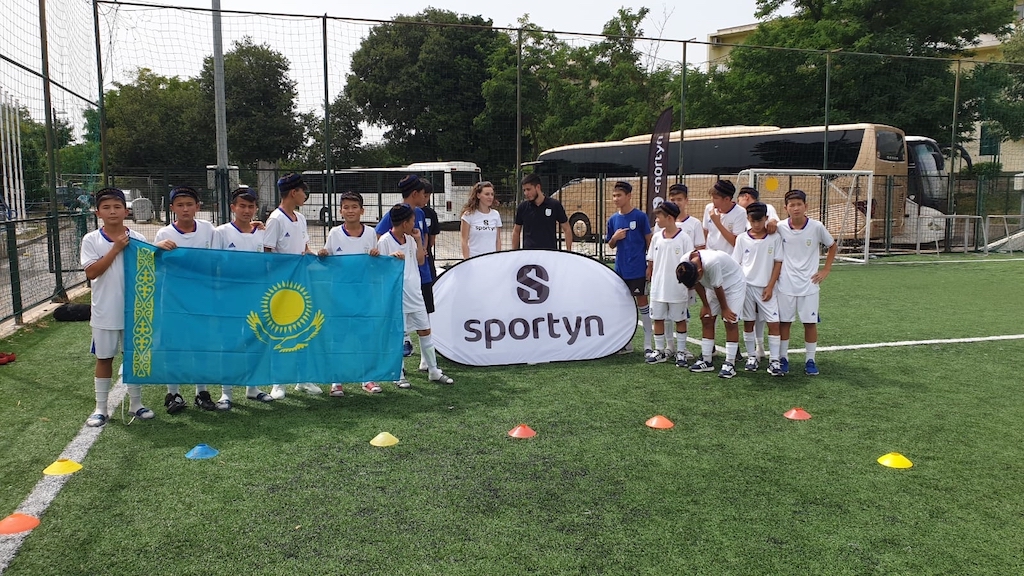
So, what is the Sportyn Challenge feature all about?
Across 4 days on these 4 Dalmatian football fields, Sportyn promoters will encourage all attendees to become a part of the Sportyn worldwide sporting community by downloading this application for free. Sportyn promoters will show players and attendees how they can participate in Sportyn challenges to win attractive prizes at the tournament.
Two unique challenges will be presented at the Dalmatinko Cup, where players will demonstrate their football skills and tricks, namely, through ball precision and football techniques to a global audience.
Daily winners will be selected by the number of views, ratings, shares, comments, and others generated by their Challenge video within the Sportyn app, with daily winners awarded and the MVP player of the tournament named based on an all-time high score! In addition, the MVP will get to take home the grand prize - brand new football cleats signed by Ivan Rakitić!
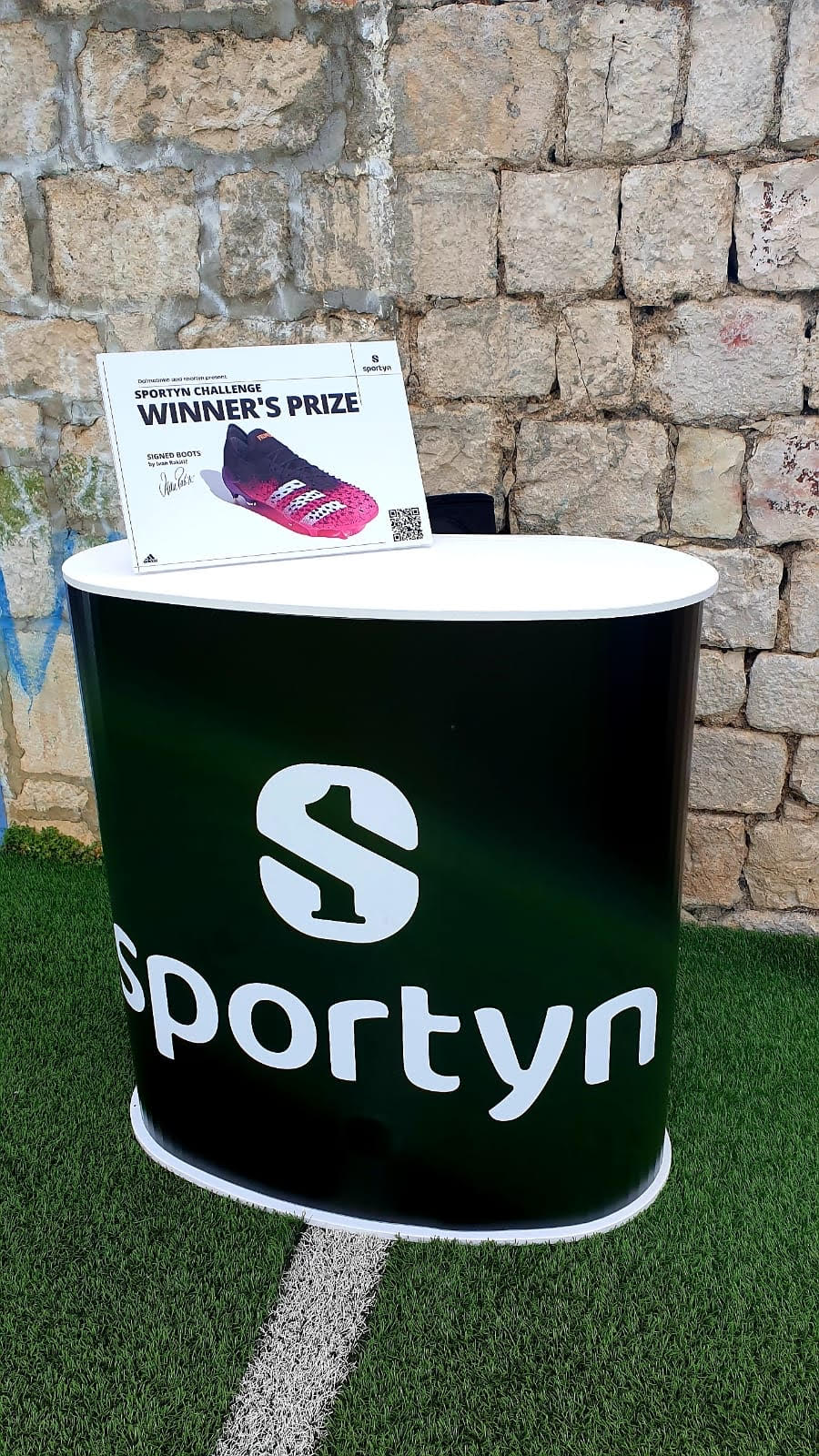
“Sportyn is happy to be a part of the Dalmatinko Cup, a sports tournament that shares our same values. We work hard to empower athletes and strive to find ways to support and promote sports and athletes. We hope that all participants will download the Sportyn application to promote Dalmatinko Cup and become a part of the world's fastest-growing sporting community,” said Sportyn founder & CEO Ivan Ilečić.
Sportyn will also host a meet & greet with Croatian football greats, including Stipe Pletikosa, Robert Jarni, and Mile Rapaić!
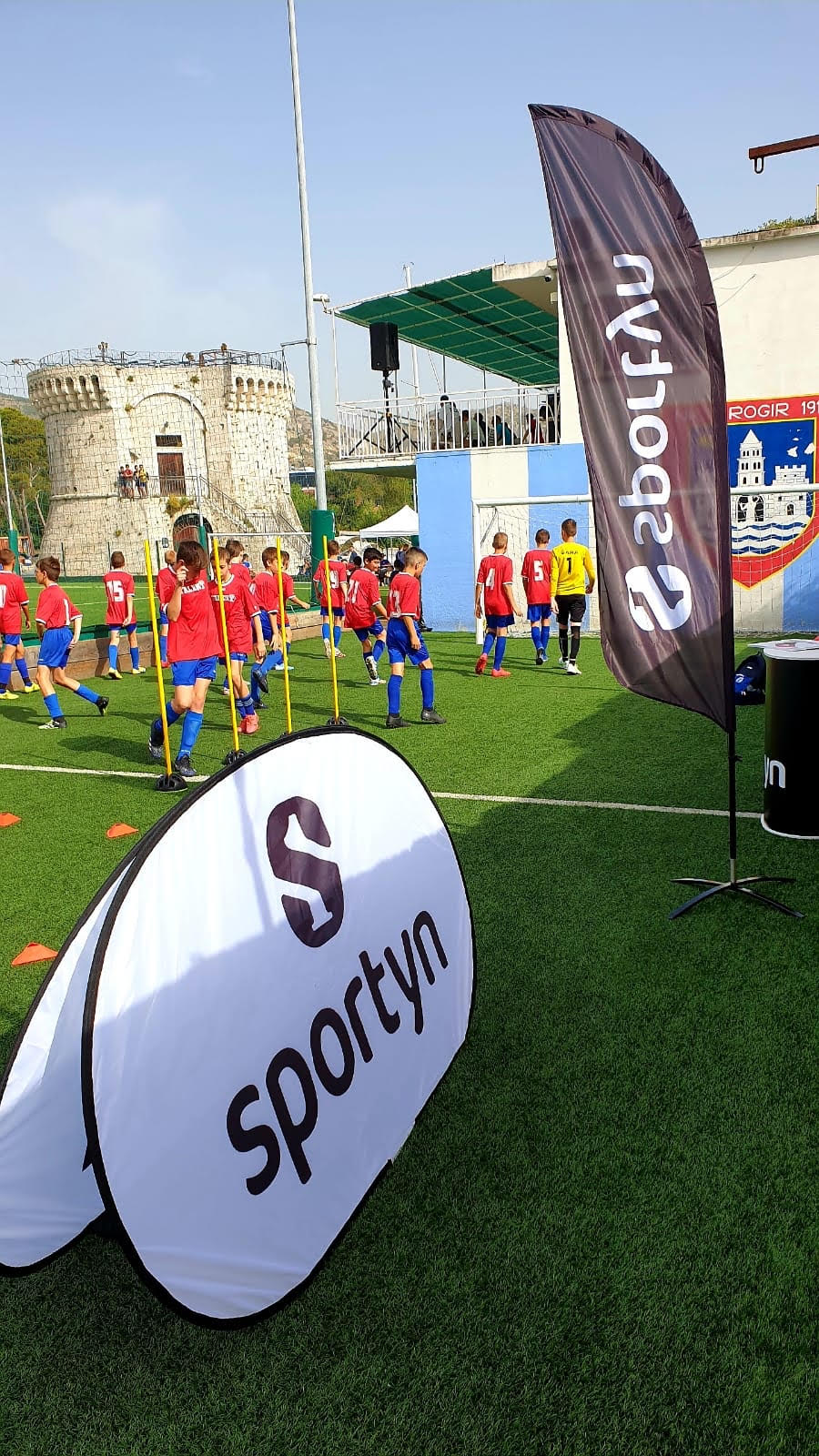
The Dalmatinko Cup closing ceremony and awards will take place after the tournament’s last game. Held at NK Trogir, team and individual awards will be enhanced by 2 acapella singing groups, brass music, and entertainment for all ages.
The matches of the tournament are broadcast live, with the images of Dalmatinka and Dalmatia reaching all over the world.
“The final, which takes place in Trogir at perhaps the most beautiful stadium in the world, which is literally on the sea and between two towers, is something to experience first hand,” concluded Bojčić.
All will have a fab footballing time!
To follow the latest sports news in Croatia, follow TCN's dedicated page.
To learn more about sport in Croatia, CLICK HERE.
Illegal Construction on Čiovo Stopped in Just Two Days!
June 8, 2021 - Illegal construction on Čiovo near Trogir was stopped in just two days, a rare occurrence in The Beautiful Croatia.
It seems that the efficiency of the state authorities' reaction to the devastation and construction without a permit on the maritime domain is finally visible, as illegal construction on Čiovo Island was stopped in just two days!
Namely, construction without "paperwork" in Arbanija was stopped in what seems like record time, and, as Slobodna Dalmacija finds out, Polish citizens were in focus.
The disputed interventions were reported to the county application "Pomorsko je dobro". Everything was forwarded to the inspection of the Ministry of the Sea, then to the State Attorney's Office, the Construction Inspection, and the Port Authority.
The foreigners obviously understood and were convinced by numerous examples that there is not much order in the country and began demolishing and building without a permit and occupying the beaches.
"Massive works are taking place without a permit at the address Cesta domovinske zahvalnosti 101 in Arbanija. We checked in the Administrative Department for Urbanism and Physical Planning in Trogir that investors do not have a permit for works of this scope, nor do they have a registered construction site. It is an extension of a large annex in front of the existing building, on an area of more than 120 square meters, on the beach not a meter and a half from the sea, spreading to the area of maritime property - the beach!
Along the way, they entered someone else's property by tearing down someone else's wall, totally exposing the backyard of neighbors living in Germany. They thus exposed their belongings in the yard to possible theft because they tore down the wall and protective fence, without permission, and with an explicit written ban on demolishing that wall by the owner of the neighboring plot," reads the letter of concerned citizens, who add this :
"The current owners and contractors are Poles, who have only recently bought a house, the new owner of the house is a company from the Czech Republic, with one employee! The owner is the company "New generation sicars and service". They came to Croatia without any respect for our country, our regulations, laws, and inhabitants. We have forwarded the reports to everyone and we ask you for supervision and investigation in order to protect the maritime domain and prevent devastation and unauthorized changes to the maritime domain."
The County Department of Maritime Affairs and Tourism, headed by the elected Deputy Mayor Stipe Čogelj, in cooperation with the Mayor of Trogir, Ante Bilić, sent a municipal warden to the scene.
"We were on the field, made a report and stopped the works and fenced the construction site with tape. The owner of the property is a company from Poland, and the work was also done by Poles, alleged friends of the owner, who disappeared from the construction site as soon as we showed up. They do not have the necessary permits and papers for the buildings where the works were found, while the house as a separate unit is legalized. The pool should not even be located there because the boundary of the maritime domain has not been determined. They submitted additional documents to us, but none of that covers the works, so we are sending a construction inspection," said the city administration of Trogir.
Fortunately, not only was this taken care of but everything was brought to an even larger institution - the Ministry of the Sea, so the employees of the Port Authority of Split were ordered from the relevant headquarters to go out on the field:
"Please, on the basis of the application, perform an inspection, suspend further construction on the maritime domain, and prohibit the use and economic use, place an official prohibition sign, all in accordance with Article 43 of the Port Authorities Act!
All institutions, from the local, regional, and state level, reacted efficiently and quickly, with united forces, and now, after the ban on the works, we are waiting for the famous one - the return to its original state!
For more on business in Croatia, follow TCN's dedicated page.
City of Trogir Third in Croatia to Introduce Full Budget Transparency
February 9, 2021 – By introducing an interactive mobile application for full budget transparency, the City of Trogir will soon join the Croatian cities of Split and Bjelovar and the municipality of Omišalj and become one of the most transparent local governments in Croatia.
Together with the Science and Society Synergy Institute, the City of Trogir signed an agreement to introduce the city budget's full transparency. The contract represents the first phase of a project to create a simple and visually attractive application that would give citizens a different budget view.
With the application, citizens would have an insight into ongoing or planned projects, the performance of previous budgets and the budget for next year, or the supplementary budget for the current year. The application would provide an overview of the current budget. At the same time, additional options will compare the plan with the performance and a comparison with previous years' budgets.
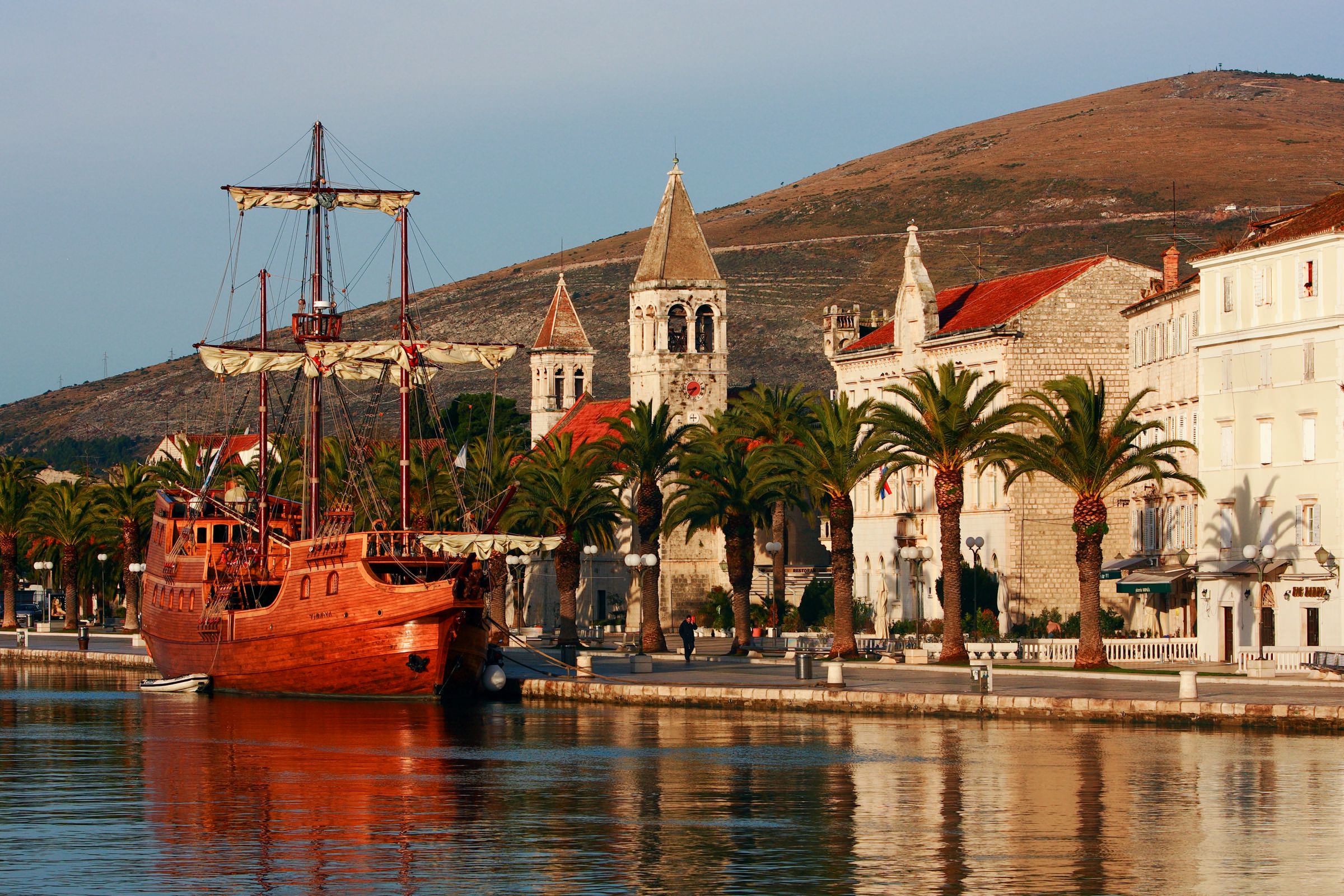
Trogir / Photo: Romulić and Stojčić
Trogir to become the most desirable small town on the coast
The City of Trogir wants to bring concrete budget items closer to the citizens through clear and simple numerical indicators and through aggregate indicators that are difficult to understand. They want to educate and sensitize citizens for certain types of strategically important projects. In other words, citizens would get an insight into what exactly their money is spent on.
"Through this project, we continue to introduce smart practices. The goal is to show how city money is managed and involve citizens in the City Administration's work as much as possible. So far, we have done this through participatory budgeting, 'And you are asked!', a project through which citizens themselves directly decide on spending part of the budget money. Last year, the Institute of Public Finance gave us grade five for transparency for the first time. We have also published an online register of city property, and with this application, we are going a step further," said Mayor of Trogir Ante Bilić.
The average assessment of Croatian cities' transparency for 2020 is 4.5, compared to the previous 2019 when it was 4.3. In 2019, Trogir received a grade of 4, and in 2020, thanks to the publication of all five city documents required for insight into transparency, a rate of 5. The number of Croatian cities of excellence increased from 65 in 2019 to as many as 87 in 2020, a positive trend.
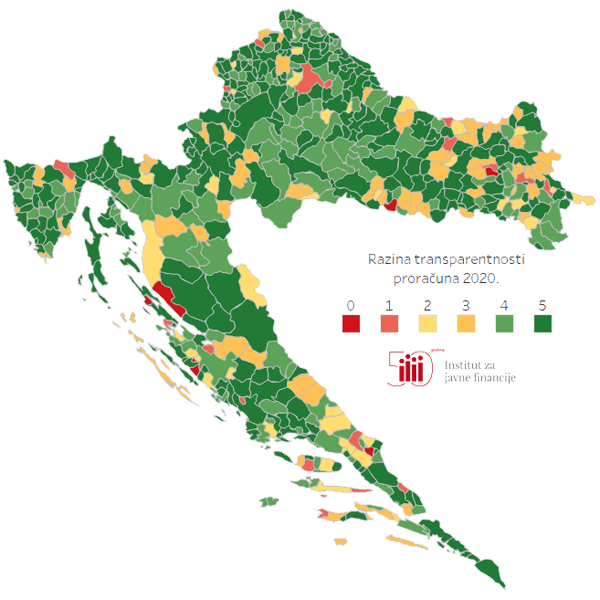
Budget transparency of Croatian cities and municipalities / Institute of Public Finance
"Budget transparency is our obligation and one part of the smart city strategy we will develop this year. This is a necessary level of development planning by which we want to make Trogir the most desirable small town on the coast in every sense. Precisely such projects by which we raise democratic standards are a guarantee that we will never end up in the problems we were in three years ago," said Bilić.
Striving for complete city transparency
This interactive visualization of the budget will be available to citizens in two months. It will be implemented by the Science and Society Synergy Institute based in Čakovec, headed by Vuk Vuković.
"The application we will create for Trogir offers an in-depth and visually attractive presentation of all revenues and expenditures up to the fourth level of the budget, according to the functional and economic classification. This data, the functional classification up to the fourth level of spending, has not been given to city councilors at budget hearings who receive budget expenditures up to a maximum of the third level. For example, the fourth level means that you can enter within each city's budget user – kindergartens, schools, museums, libraries – and see who spent how much on salaries, maintenance, what they bought, etc. The third level gives only the total amount received by which user, without going into details. With this presentation, citizens have a more detailed insight into city spending than city politicians," Vuković explained.
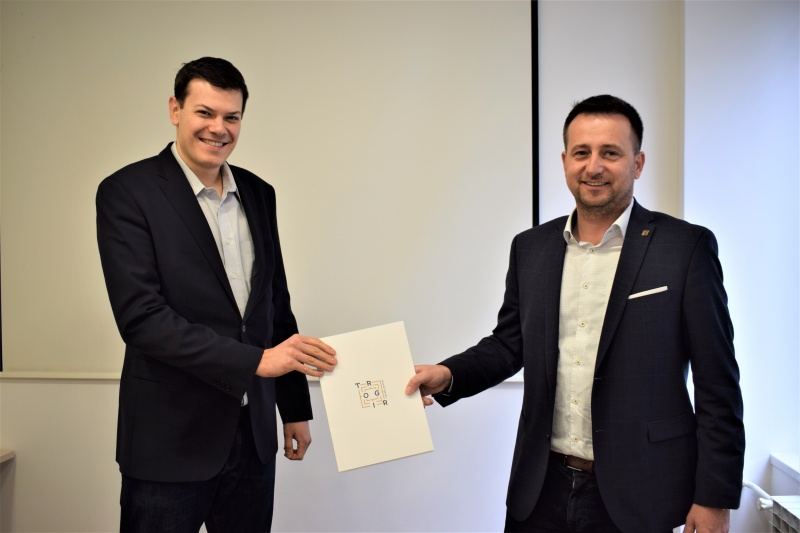
Ante Bilić and Vuk Vuković / Photo: Trogir.hr
Following an interactive budget guide, the next step will be a detailed overview of all budget accounts. Citizens would have an insight into each transaction from the budget, from public procurement to entertainment expenses. Then there will be complete transparency of the city towards users.
Bjelovar was the first to introduce transparency application
Thus, Trogir will be one of only three cities in Croatia and Southeast Europe with a completely transparent budget. A similar practice has been introduced by the Croatian cities of Bjelovar and Split and the municipality of Omišalj, which also introduced applications for insight into the city budget. The City of Bjelovar presented a similar application in February 2019. Vuković also helped them, making them the first most transparent city in Croatia, for which they were awarded that year.
"Bjelovar has thus embarked on a unique undertaking in Croatia and this part of Europe, which is to raise transparency to a level that has not been introduced in any public authority so far, to raise the quality of the City Administration's work and strengthen public confidence," said Vuković at the time, as reported from Bjelovar.
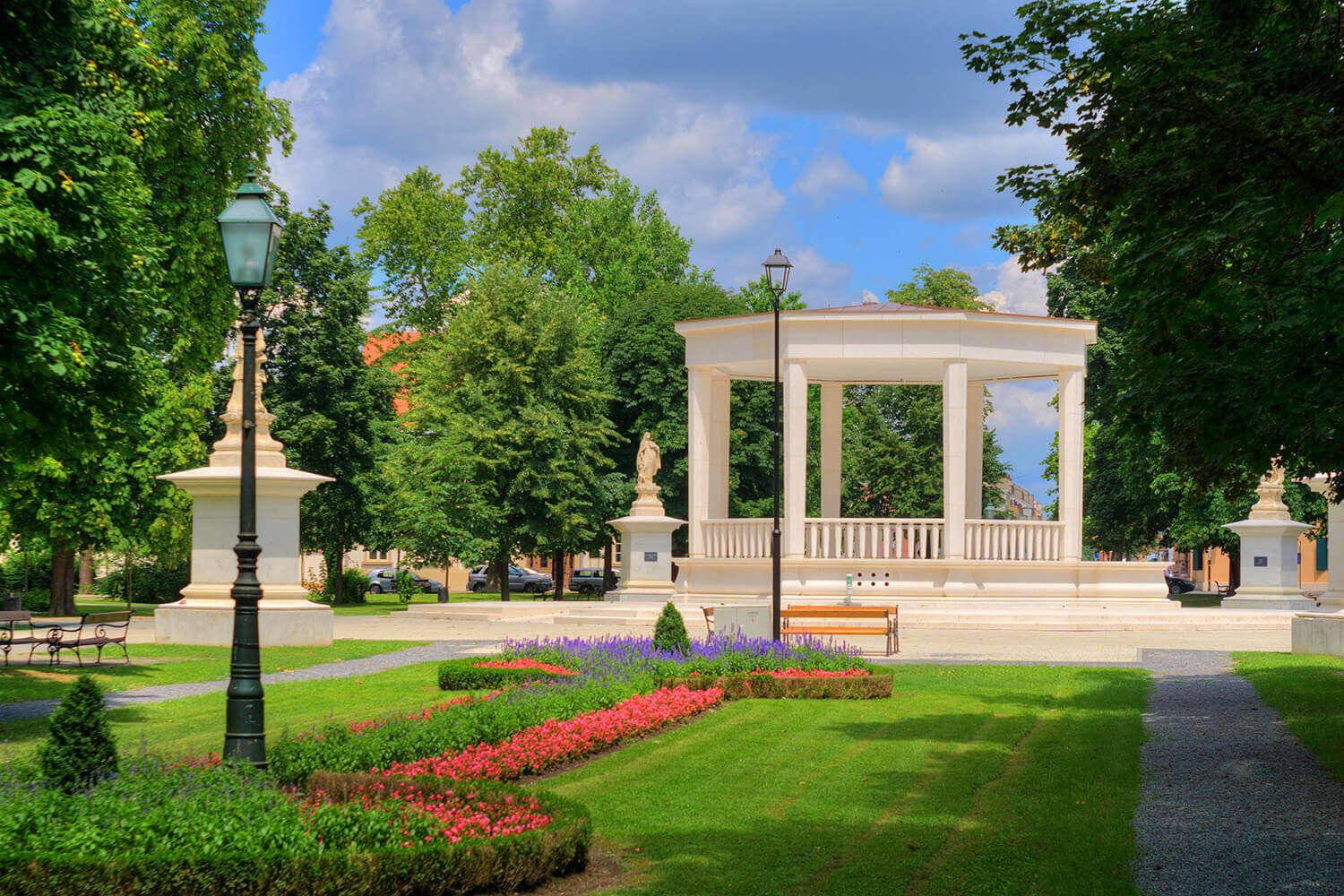
Bjelovar Pavilion / Photo: Bjelovar.hr
Bjelovar's positive example was followed by the municipality of Omišalj, which introduced the transparency application at the end of March 2020. The largest Croatian city on the coast – Split – also decided to do so, and neighboring Trogir took over its practice.
Namely, the citizens' right to access information held by public authorities is guaranteed by the Republic of Croatia's Constitution. Therefore, in addition to the moral, the public authority also has a legal duty to provide information on public money spending. However, while in developed democracies such transparency is considered the standard and, for example, all individual transactions from the US federal budget of 1.5 billion dollars are available to the public through an interactive Internet search engine, in Croatia it has never existed before, nor are public authorities considered this possibility.
This trend seems to be changing in Croatia. The transparency of Croatian cities is presented in an interactive map of the Institute of Public Finance.
To read more about lifestyle in Croatia, follow TCN's dedicated page.
Plastic-Free Croatia: Croatian Cities and Islands Moving to Reduce Plastic Waste
February 7, 2021 - Dubrovnik, Trogir, Stari Grad on Hvar, and Sali on Dugi Otok will be the first in Croatia to reduce plastic waste and use alternative solutions by participating in projects implemented by the Split Association "Sunce" for Nature, Environment, and Sustainable Development, setting the pace for a plastic-free Croatia.
Glas Istre reports that "Plastic Smart Cities Croatia" and "For Plastic Free Croatian Islands" aim to reduce plastic waste and use alternative solutions. They analyze the use of disposable plastics and waste plastic management in the local communities involved, develop and implement a "Plastic-Free Plan" with a participatory approach and workshops, as well as organize "plastic-free" public events, i.e., events and public forums aimed at raising awareness in the local population about the consequences of plastic pollution.
One of the important activities is implementing a national campaign to raise awareness of the impact of plastic pollution on the marine environment and available sustainable solutions in the island communities on Hvar and Dugi Otok. The Split Association for Nature, Environment and Sustainable Development "Sunce"is currently working on organizing workshops for networking partners and environmental organizations engaged in this topic.
It is in this project that the pioneer association "Sunce" began implementing the projects "Plastic Smart Cities Croatia" and "For Plastic Free Croatian Islands" to reduce the plastic footprint in various segments of social life in local communities by reducing the use of disposable plastic and encouraging the use of alternative solutions for plastic waste. One of their project goals is to raise the awareness of citizens and the public about plastic waste.
After the completion of the project, a final conference will be held aimed at disseminating the project results and encouraging the further reduction of plastic waste for representatives of local island authorities, national and international NGOs, local government units, representatives of the Croatian Chamber of Commerce, tourism, relevant ministries, and other stakeholders, with the message "Reduce the use of disposable plastics and look for more sustainable solutions!", which the Sunce Split Association has been advocating for many years.
They remind that a new Law on Waste should be adopted in Croatia this year, which, among other things, contains some provisions of the EU Directive on reducing the impact of certain plastic products on the environment. At the end of last year, independently and in cooperation with other environmental protection associations in Croatia, they sent their comments on the Waste Act's draft proposal.
They add that the European organization "Seas at Risk," which brings together several associations dealing with protecting the marine environment, assessed last summer that the EU directive is an ambitious plan to dispose of ten non-reusable plastic items, and which can most often be found on beaches across Europe, but that its implementation into national legislation in most European countries has been halted.
The COVID-19 crisis has led to a dramatic increase in the use and the rejection of disposable plastic objects in nature.
"The Mediterranean Sea is one of the world's most polluted seas, and half of this enormous amount of waste comes from the mainland. With 400 kilotons of waste generated annually, Croatia ranks third in the region. Hence, it is imperative to take urgent measures and raise awareness to numerous visitors about the need for urgent action, i.e., reducing disposable plastic use.
Namely, tourism has been identified as one of the key actors, so part of the awareness campaign within the "Plastic Smart Cities" project is aimed at foreign and domestic tourists, the Sunce Split Association points out.
The EU directive on plastic waste was adopted in 2019 after a trialogue, i.e., negotiations between the European Parliament, the Commission, and the EU Council. This year, all EU countries must finally implement it. The Law on Waste in Croatia should be adopted by July 3 at the latest. Croatia should also throw out disposable plastic products, namely plastic q-tips, cutlery, plates, straws, drink sticks, and balloon holders.
After adopting the directive in the European Parliament, the then Croatian MEP Davor Škrlec from the Green Group said that the directive should be used to encourage change for us as a society to produce less garbage and become sustainable.
"If we do not change our attitude towards production, consumption, and waste, the human species will become consumable like a disposable coffee cup. This directive will help us abandon disposable plastics on the road to less consumption, better designed reusable products, more innovation, and a cleaner environment," Škrlec said then.
The directive also includes provisions for the disposal of cigarette butts, which are a significant polluter, the objectives of collecting beverage bottles, and the requirement to redesign beverage stoppers to connect them to bottles. The directive also includes national targets for reducing the consumption of plastic cups and food containers, and ultimately a total ban on oxo-degradable plastics often referred to as biodegradable but in reality fragmented into microplastics.
Disposable plastic products and fishing gear together account for 70 percent of Europe's marine litter, so it is expected that Europe's seas will be significantly cleaner by implementing the directive.
According to the Commission, the directive will bring many benefits for the environment and the economy. Environmental damage would be avoided, costing €22 billion by 2030, and saving consumers up to €6.5 billion, with an adjustment cost estimated at €3.2 billion for manufacturers.
At the end of last year, the Commission adopted new rules on the import and ban on exports of plastic waste to third countries that do not have the capacity to manage it in a sustainable way, which is one of the main points of the European Green Plan and EU Circular Action Plan.
To read more about lifestyle in Croatia, follow TCN's dedicated page.
New Trogir Fitness Centar 17 First in Croatia Protected with Truu Original Air Disinfectant
November 21, 2020 - The brand new Fitness Centar 17 in Trogir is the first in Croatia to be protected with the Truu Original Air disinfectant.
24 Sata reports that a sense of security is paramount today as our hygiene fears have been heightened thanks to the coronavirus pandemic. Hospitals, schools, kindergartens, shops, salons, gyms, banks, and shopping malls, are places we visit every day, but given the current pandemic, we cut our time there short, and masks are a necessary accessory.
In Trogir, as part of the Marisa shopping center, a new Fitness Center 17 has opened, and it is the first public space in Croatia that has been completely disinfected with truu original air. Therefore, it is completely protected from bacteria, viruses and allergens.
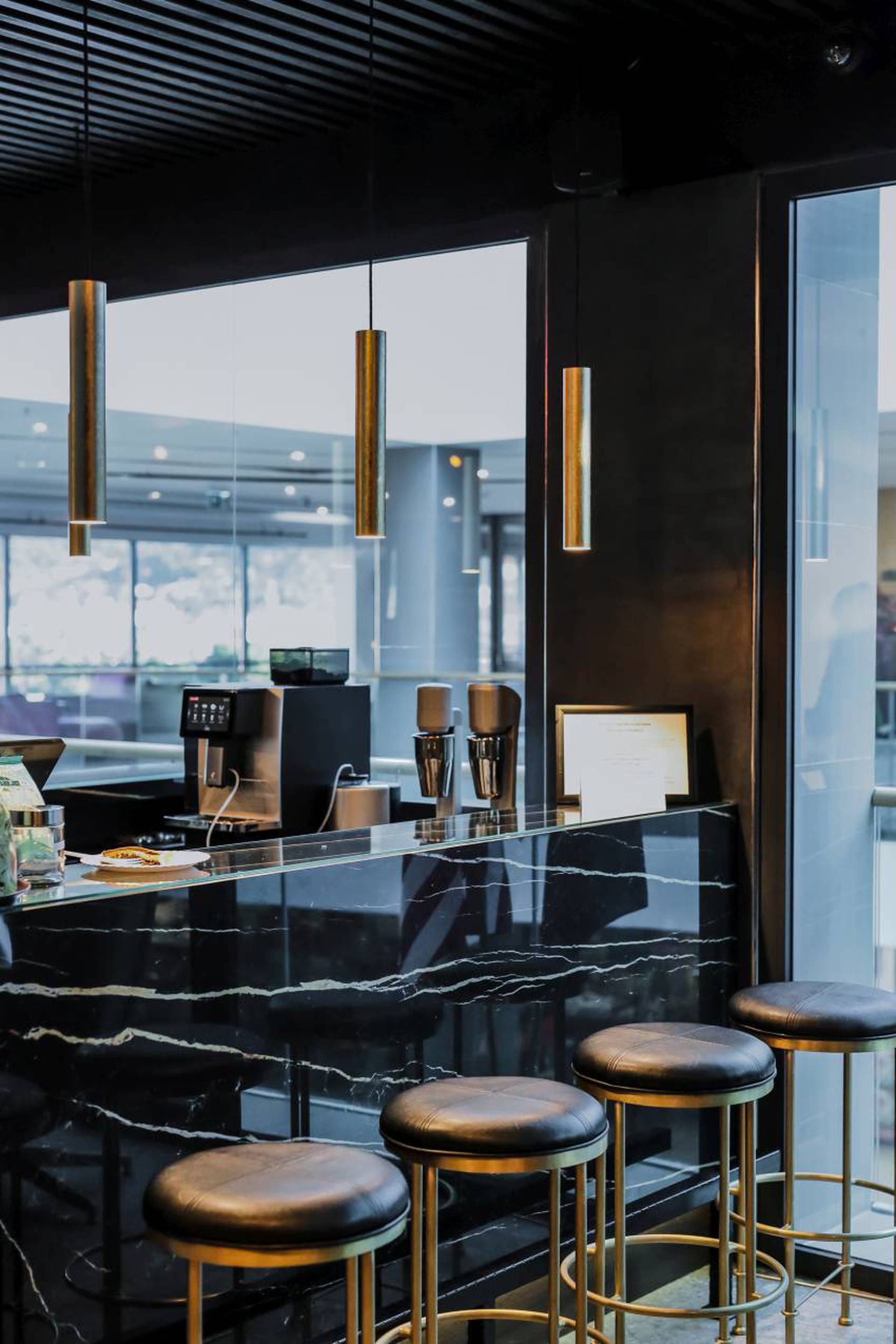
Peter Fabijan
Truu is a revolutionary long-term disinfectant that has recently become available in Croatia and which has attracted the attention of the public with its presence. "Truu original air pro" and "truu original air pro" act against microbes on all surfaces, just like in the air we breathe. Fitness center 17 is equipped with Life Fitness equipment, and its modern decor grabs your attention as soon as you enter the space. It is interesting that at the very entrance there are thermal cameras that measure the temperature of visitors, which at this time, is also quite important. Inside the gym, you can also consume fully purified truu water at any time.
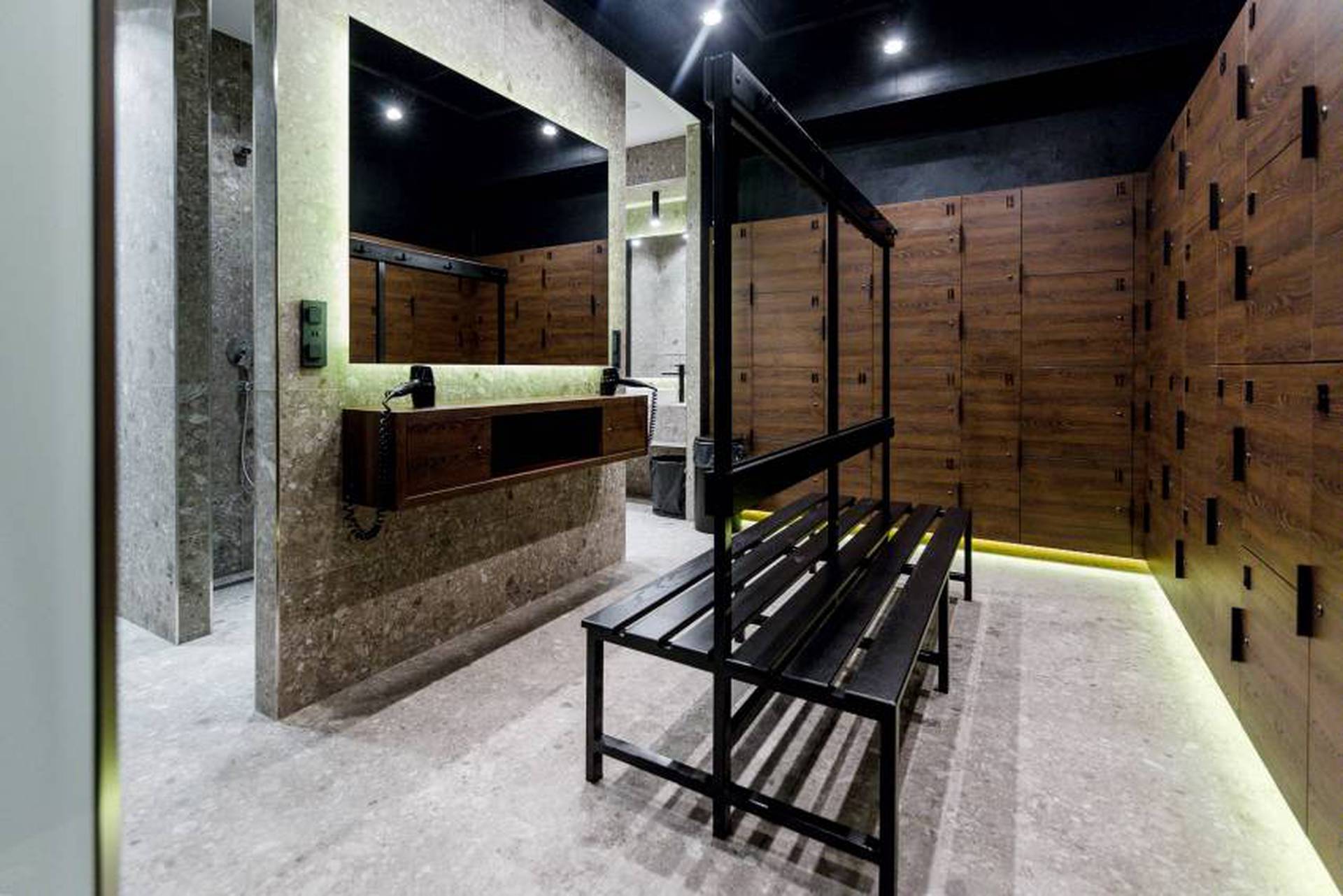
truu
"Truu original air pro" and "truu original air pro" can be applied to any surface, whether it is concrete, glass, ceramics, wood, metal, or even textiles. They are based on evaporating water. After the water evaporates, a microscopic thin layer remains on the surface that can act for years. It is this method that has ensured that at the newly opened Fitness Center 17, everyone will be more than safe.
The stunning sea view will make every workout even more beautiful, and the delicately designed bathrooms and locker rooms, as well as the exercise space itself, are complemented by a popular industrial style.
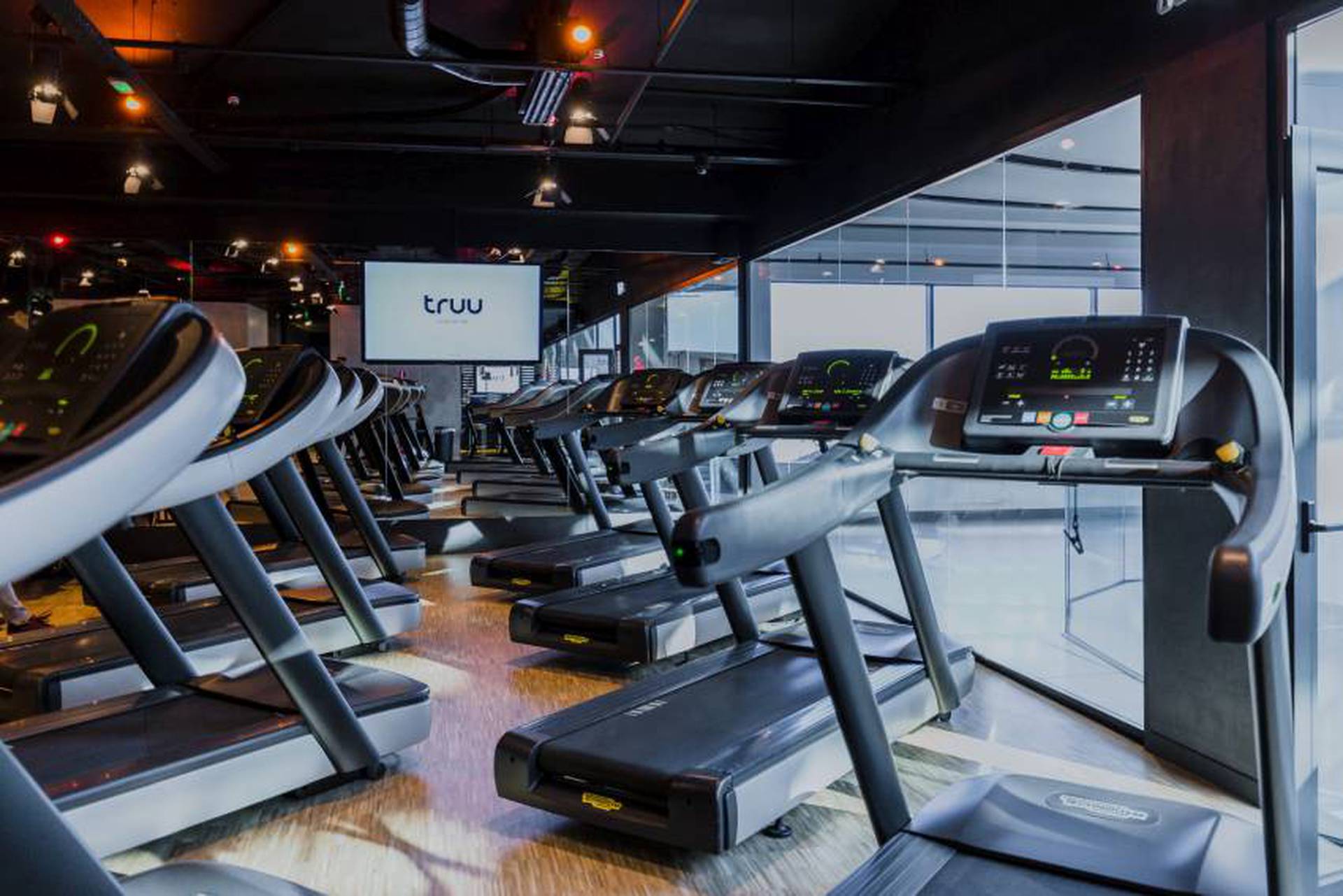
truu
Fitness Center 17 is the first public space in Croatia that is protected in this way. Stay protected from all kinds of harmful substances with the help of invisible and environmentally friendly water-based coatings, which work effectively 24 hours a day, 7 days a week. And up to a few years! The gym is located at 112 Kardinala Alojzija Stepinca Street, Trogir.
To read more about lifestyle in Croatia, follow TCN's dedicated page.
City of Trogir and Hajduk Move Forward with Football Camp
November 20, 2020 - The City of Trogir and Hajduk are moving forward with the construction of a modern football camp, Hajduk’s most important infrastructure project in the 21st century.
On Thursday, HNK Hajduk president Lukša Jakobušić held an operational meeting in Trogir accompanied by the President's head of office Jelena Mikačić, Trogir Mayor Ante Bilić, and his associates, Deputy Mayor Viktor Novak and City Council President Ante Piteša.
This is a continuation of the project initiated by the former Hajduk President Marin Brbić, who in July signed a contract for the construction of a capital infrastructure project at the Divulje barracks near Split Airport as a solid foundation for the development and progress of the Split club.
Several important topics were discussed with the priority of transferring land from the Ministry of Defense to the City of Trogir. It is usually a longer process, but with joint efforts, all participants in the meeting believe it will be completed soon. Among other things, project financing was discussed, and various options for external funding sources were considered. Mayor Bilić reported that the City is already working intensively on land parceling and that registration in the cadastre can be expected in about 10 days. Also, the City has already initiated Amendments to the Spatial Plan at the City Council.
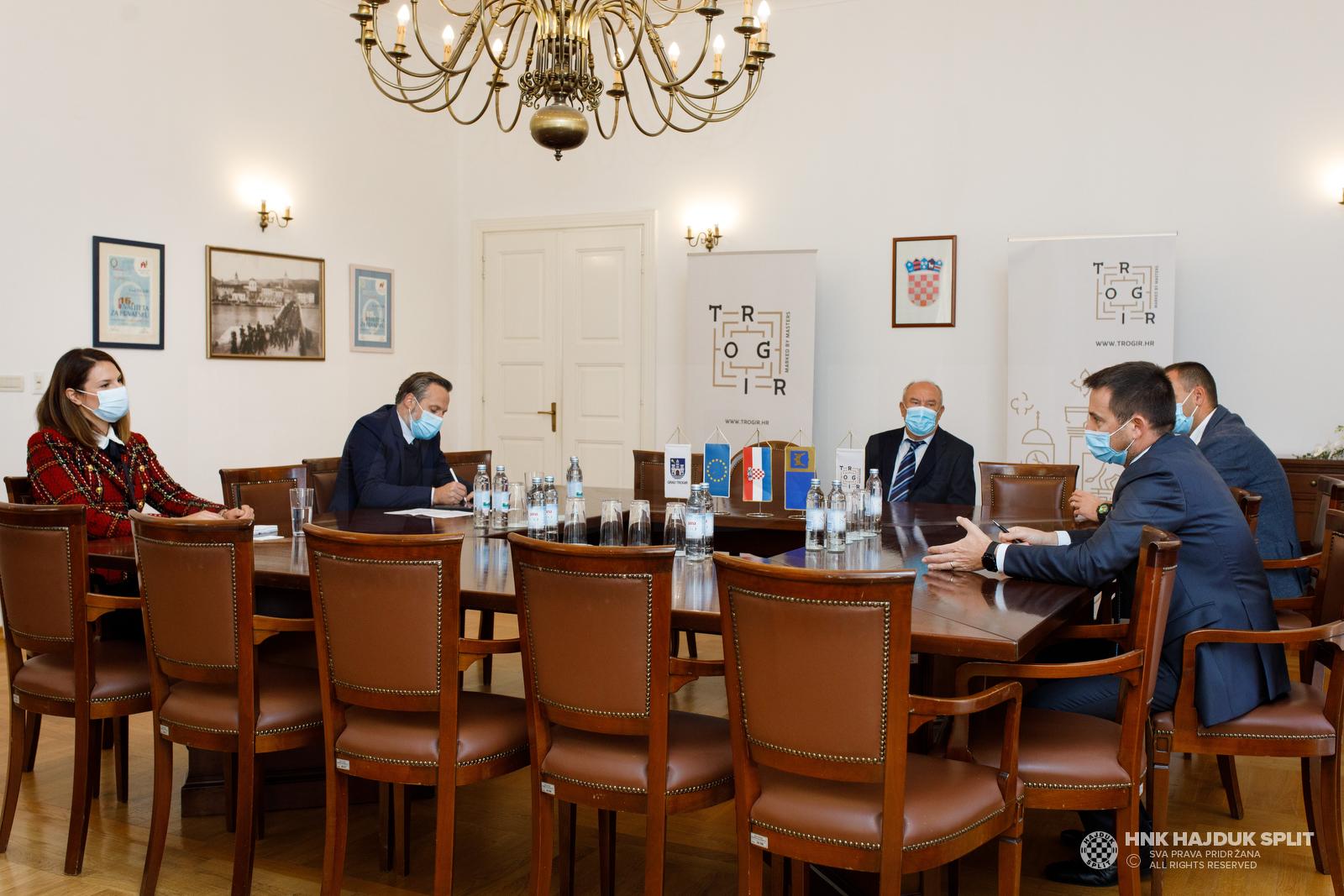
A working, conceptual solution already exists, but given the space's value, it was agreed to make an architectural and urban tender for this scope. They will contact the Society of Architects Split, with which the City of Trogir has been cooperating for the last few years to conduct the competition as professionally and as well as possible. Upon completion of the project and complex financial construction, there are permits. The camp's construction is planned in phases, and the joint conclusion of the City and Hajduk is that the camp will be in full operation in the next four years.
"This was a working meeting with the representatives of the city of Trogir, whom I thank for their exceptional cooperation and concreteness. We don’t want to waste time, but be productive. The camp's construction is, along with the success and result of the first team and the creation of a winning mentality, one of the most important projects of my term. I am aware that four years are concise for realizing the project, but the plan is for the camp to be built and put into operation during that period. I will personally participate in the project until a member of the Board is appointed who will, among other things, be in charge of building the camp," said Jakobušić, who gifted jerseys to the representatives of the City of Trogir after the meeting.
"We are happy that this project remains among the priorities for President Jakobušić, as well as with the steps we agreed on at our first operational meeting. Since the signing of the contract and the council session, we have communicated with the Ministry of Defense, and I believe that the transfer of ownership will soon be formally completed. Hajduk's camp is important for Trogir for many reasons, primarily because of the new modern sports infrastructure that does not exist in this part of Europe that will benefit our citizens, and depending on the final appearance of the project, be part of our additional tourist offer. Initially, we planned to build the stadium on our own. Still, the renovation of our Batarija with the infrastructure that we will get through this camp with Hajduk as a partner is a better solution from its aspect. There is no need to talk about the pride of my fellow citizens that Trogir will become the second home of Hajduk. There is still a lot of work ahead of us, but the plan presented to us seems sustainable and rational," said the Mayor of Trogir Ante Bilić.
Source: Hajduk website
To read more about sport in Croatia, follow TCN's dedicated page.


